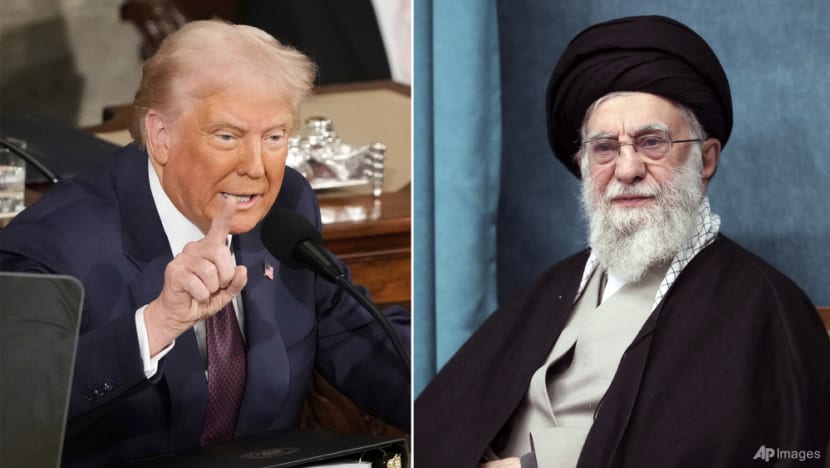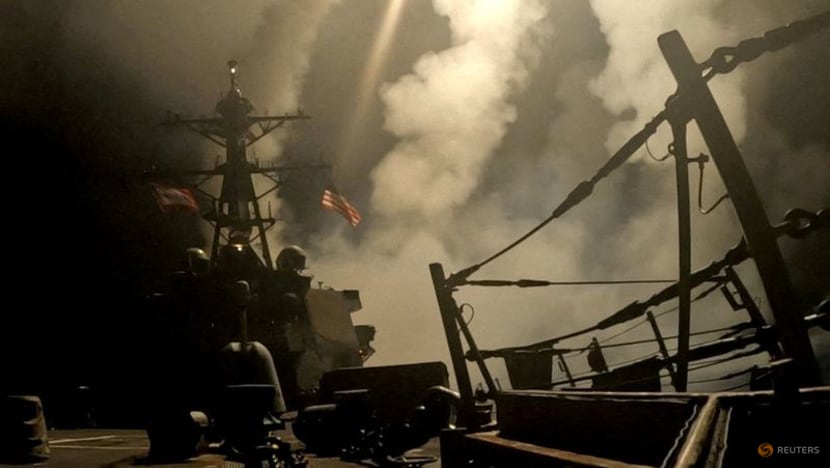Commentary: US strikes on Houthis sent a message. Iran heard it loud and clear
By now, Iran should be clear-headed about US President Donald Trump’s appetite for risks, but his call for a deal also offers an opportunity to manoeuvre, says NUS Middle East Institute’s Clemens Chay.

Composite image showing US President Donald Trump, left, addressing a joint session of Congress at the Capitol in Washington, Mar 4, 2025, and a handout of Iran leader Ali Khamenei attending a ceremony in Tehran, Mar 8, 2025. (AP Photo/Ben Curtis - Office of the Iranian Supreme Leader via AP)

This audio is generated by an AI tool.
SINGAPORE: After airstrikes on Yemen’s Houthi rebels and the attendant furore over “Signalgate” in March, the real motivation behind renewed American military action in the Middle East has become clear: Strong-arming Iran into coming to the negotiating table.
After meeting Israeli Prime Minister Benjamin Netanyahu on Monday (Apr 7), United States President Donald Trump announced that the US and Iran would hold “direct talks” on Tehran’s nuclear programme. This was a bolt from the blue – a remarkable turnaround.
Iran had vacillated between talking or not. A month ago, Supreme Leader Ayatollah Ali Khamenei pointedly rejected a call to negotiate, calling the US a “bully”. To be sure, the Islamic Republic has hedged its bets: It has said that direct talks will only come about if earlier, indirect negotiations with Oman as mediator are “respectful and productive”.
To Middle East watchers, the route from attacks on Houthis to talks with Iran was not entirely surprising.

WHAT SIGNALGATE REVEALED ABOUT US CORE INTERESTS
The security of maritime routes, particularly the Red Sea – which handled 12 per cent to 15 per cent of global trade in 2023 – is undoubtedly a priority for the US.
Indeed, in one message on the Signal group chat, Defence Secretary Pete Hegseth described freedom of navigation as a “core national interest”, never mind the remarks from Vice President JD Vance and others about bailing out “freeloading” Europe and Egypt.
As a consequence of Houthi attacks on commercial and naval vessels since November 2023, the number of ships that typically traverse the Red Sea to use the Suez Canal almost halved by 2024. More companies opted for longer routes around Africa, increasing costs and causing delays.
The resulting supply chain crisis, according to leaked messages from US National Security Adviser Mike Waltz, steered Washington into making the “fundamental decision of allowing the sea lanes to remain closed, or to re-open them”, as they affected shipping of “manufactured goods for trans-Atlantic trade to the United States”.
The US strikes were accompanied by messaging on two of Mr Trump’s pet topics: The ineffectiveness of his predecessor’s “pinprick”, “feckless” actions and “holding Iran accountable”.
MAKING A COMPELLING CASE FOR IRAN TO NEGOTIATE
About a week before the airstrikes, the US President told Fox Business that there were two ways to approach Iran: “Militarily, or you make a deal”.
Mr Trump was referring to a letter sent to Iran’s Supreme Leader via an Emirati diplomat, demanding negotiations to curtail Tehran’s nuclear programme. He repeated the threat after his meeting with Mr Netanyahu, saying that “everybody agrees that doing a deal would be preferable to doing the obvious” and ”we are going to see if we can avoid it, but it’s going to be very dangerous territory”.
While Iran has publicly denied any potential militarisation of its nuclear programme, the International Atomic Energy Agency has called Tehran’s stockpile of uranium, now enriched to 60 per cent and just below the level of purity needed for a nuclear weapon, “worrisome”.
Iran is also extraordinarily vulnerable right now: Its proxies, Hamas and Hezbollah, have been severely weakened by Israeli military actions over the course of 2024, and the ouster of Syria’s Bashar al-Assad has made a bad situation worse.
Pursuing nuclear weapons would help it restore deterrence, but also invite a potential Israeli, if not American, response while it is on the ropes. It nevertheless remains defiant, at least publicly, and has sought public assurances from both China and Russia as alternative mediators to nuclear talks, with little success.
RISKS AND OPENINGS
Mr Trump has no doubt noticed, and is intent on making hay while the sun shines. He has derided the Obama nuclear deal as weak, and since his “maximum pressure” campaign during the first term came up empty, he has adopted a different tack in a bid to get a better agreement.
Just in case Iran did not get the message, the Pentagon has also since deployed part of the US Air Force’s stealth bomber fleet to the Indian Ocean island of Diego Garcia, within striking distance of Houthi territory and Iran.
Facing these threats, Tehran will be worrying not only about economic troubles at home but also being subjected to the snapback mechanism from the 2015 deal. Though the US withdrew from the Joint Comprehensive Plan of Action in 2018, any of the current members – France, the United Kingdom, Germany, China, the European Union and Russia – can still trigger it to reimpose United Nations sanctions.
If Iran were to maintain defiance, it has the option of mobilising what is left of its militias in Iraq or closing the Strait of Hormuz, both of which could quickly spiral downward into a regional war. This may not be a risk that Iran is willing to take, considering its weakened state – nor is it in the interest of Washington’s Arab partners in the region.
The most pragmatic option remains to negotiate while saving face.
The strikes on the Houthis thus sent multiple signals to Iran: It will be held accountable for its proxies’ actions in the Middle East, and adventurism will further weaken its already shaky hand. Tehran should be clear-headed, by now, about Mr Trump’s appetite for risks.
But it should also bear in mind that his call for a deal offers an opportunity to manoeuvre. The announcements about talks, whether direct or indirect, offer the clearest signal that there is realism within Iran about the predicament it finds itself in.
Clemens Chay is Research Fellow at the Middle East Institute, National University of Singapore.


















